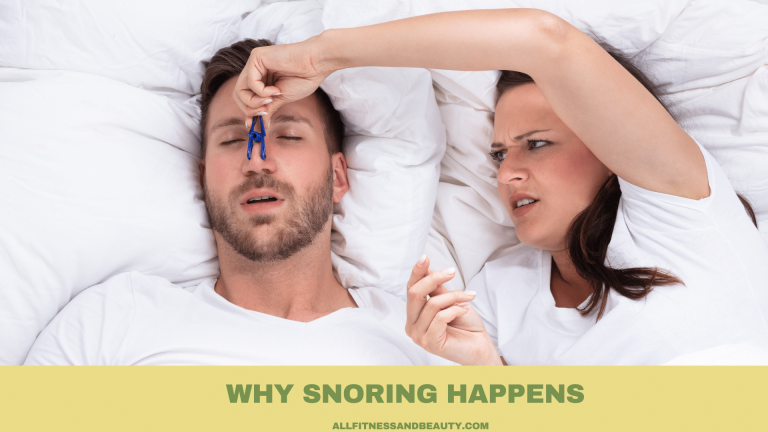Can Snoring Cause a Sore Throat?

Snoring is harmless for most people. However, it can be a symptom of an underlying medical condition. If you snore loudly, you may notice a sore throat upon waking up. But can snoring cause a sore throat? Or other issues might have caused it?
Keep reading to know more.
Can Snoring Cause a Sore Throat?
It can cause a sore throat because of the constant vibration that it produces. It is also connected with mouth breathing. Snoring makes your mouth dry. Your throat will also be scratchy when you wake up.
And as mentioned, it can be a sign of a medical condition. For many people, it can be a sign of sleep apnea. It’s a serious sleep disorder. With this condition, your breathing starts and stops several times while you’re asleep.
There are various types of sleep apnea. The most common type is obstructive sleep apnea (OSA). When you have this condition, your throat muscles will relax and block your airway while lying down. As a result, it becomes harder for you to breathe while sleeping.
You may not know that you have this condition. But if you often have a sore throat or a dry mouth upon waking up, then it can be a telltale sign.
If you experience this sign, make sure to tell your doctor. You may need to undergo a sleep study. It monitors your heart, lungs, and brain activity. Your doctor may also request some tests to confirm this disorder.
See Also: Can snoring cause a swollen uvula?
What Helps a Sore Throat from Snoring?
The best way to treat a sore throat from snoring is to treat the underlying cause. Thus, you need to talk to your doctor about it. You may have sleep apnea.
You should also consider the following tips:
- Avoid drinking alcohol before going to bed
- Don’t take nonessential meds that can make it difficult for you to sleep
- Avoid sleeping on your back
- Maintain a moderate weight
If these things don’t treat your snoring, your doctor may recommend using a CPAP device. It’s a machine that pumps air through a face mask into your airway while you sleep. It keeps your airways open, thereby reducing your sleep apnea.
Another option is to wear a dental device. It can bring your bottom jaw forward and keep the airways open.
Surgery may also be an option. But it will be the last resort. This procedure can remove excess tissue from the back of your throat. It also removes airway blockages.
If it’s not sleep apnea, though, you may be suffering from a certain form of allergy. It causes nasal congestion and postnasal drip.
Excess mucus can lead to itching, soreness, and irritation. And if you have postnasal drip, your sore throat may get worse at night or first thing in the morning.
To treat your allergies, make sure to use hypoallergenic pillows. Then, to reduce dust levels, you should de-clutter your room.
Then, instead of carpets, use wooden floors. Make sure to keep your home dry. It has to be well-ventilated to prevent mold growth.
It’s also worth it to invest in a HEPA filter. It can remove potential allergens from the air.
See Also: Why snoring happens?
Can You Damage Your Throat by Snoring? 
Heavy snoring can damage your throat. It damages the upper airway tract that extends from the nasal cavities to your pharynx and larynx.
The damage can be treated with dilators, ventilators, and surgery.
If your snoring is not treated early, it can cause loss of nerves and muscle mass in the palate. When the damage happens, the body may not heal properly even though there are neurotransmitters that can heal and regenerate neurons.
Damage to the nerves as a result of snoring can impair thermal sensitivity in your throat. It can suggest damage to the oropharynx.
Can Snoring Cause a Swollen Throat?
Yes, it can cause a swollen throat. If you think that your swollen uvula is the result of snoring, you need to talk to your doctor. You may have to undergo certain tests, such as a sleep study.
Your treatment depends on a lot of things. Your snoring may reduce if you drop pounds. It’s especially true if you are overweight.
Cutting back on alcohol may also help.
If you have nasal congestion, snoring may happen. Thus, before you sleep, use nasal decongestants and consider sleeping in a different position.
You should also use a mouth guard. But talk to your doctor about it before wearing one.
Your doctor may also recommend wearing a CPAP device to ensure that your airway is open while you’re sleeping.
Why Do I Get Sore Throat When I Wake Up?
Snoring isn’t the only cause of your sore throat when you wake up. There are a lot of factors here.
It can be that you left your windows open and the air quality has been affected while you sleep. Cool air can indeed help you breathe better. However, if the air is dry, it may affect your breathing.
If you’re using fans, they can dry your air. You may stop using them but if the white noise is helping you sleep better, then make sure to position the fan away from you. The air will still circulate while you still hear background white noise that can lull you to sleep.
A dry environment is another reason for a sore throat when taking up. Hay fever can be a culprit.
If the air is dry, you may use a humidifier. Before bed, make sure to drink water.
You may also be mouth breathing. When you breathe from your nose, it keeps moisture in your throat and mouth. If your nasal passages are not clear, you may end up breathing out of your mouth, causing a sore throat.
Acid reflux may also cause a sore throat upon waking up. If you suffer from this condition, you may consider using pillows, especially for patients with GERD. You may also take an acid-blocker.
However, it’s not the best option. Instead, opt to eat a few hours before bedtime. Make sure to avoid alcohol. Talk to your doctor about the other things that can help with your GERD.
Summary
Can snoring cause a sore throat? Yes, it can. You should consider talking to your doctor to know what causes your heavy snoring.
To temporarily reduce your snoring, please check out this anti-snoring device.




Leave a comment